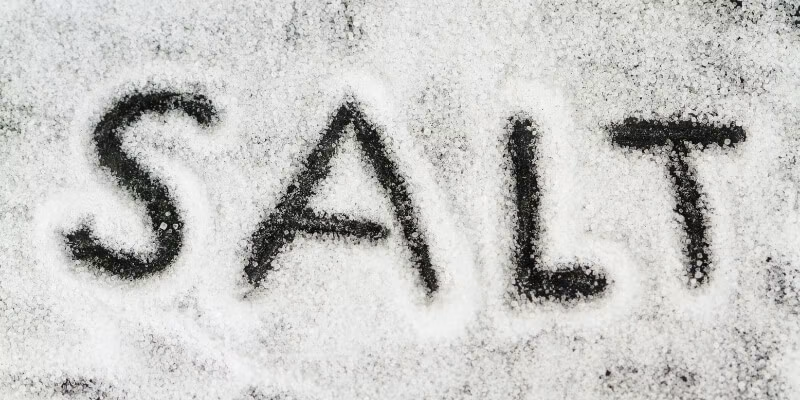Salt: The Bitter Truth About This Flavor Enhancer

Learn why salt can harm you, including exotic varieties such as Himalayan and sea salts. Discover why chicken is so salty and how excess salt affects the body. Find out how to cut down on salt and still enjoy delicious meals.
Introduction:
Salt is one of the most commonly used flavor enhancers in the world. It’s found in virtually every cuisine, and it’s hard to imagine a world without it. But have you ever wondered why salt is so prevalent and whether it’s actually good for you?
In this comprehensive article, we’ll explore the different types of salt, including exotic varieties such as Himalayan and sea salts.
We’ll also delve into why chicken is so salty and how excess salt can affect the body. Most importantly, we’ll provide tips on reducing salt and enjoying flavorful meals.
Types of Salt
Many different types of salt are available, each with its unique properties and flavors. Here are some of the most popular types:
Table Salt
Table salt is the most commonly used type of salt in the world. It’s highly refined, stripped of impurities, and contains iodine, essential for thyroid health.
Sea Salt
Sea salt is made by evaporating seawater, leaving behind a slightly coarse, grayish-white salt. It contains trace amounts of minerals, including magnesium, calcium, and potassium, which can add flavor and nutrition to your diet.
Himalayan Salt
Himalayan salt is a pinkish salt that’s mined in the Himalayan mountains. It contains many trace minerals, including iron, which gives it its unique color.
Why is Chicken So Salty?
Have you ever wondered why chicken is so salty, even when not seasoned with salt? The answer lies in the way chicken is raised.
Most chicken producers inject their birds with a saline solution to make them plumper and more flavorful. This can add up to 500 milligrams of sodium per serving, quickly adding up if you eat chicken frequently.
How Excess Salt Affects the Body
While some salt is essential for good health, too much can be harmful. Excess salt can lead to several health problems, including:
High Blood Pressure
Excess salt can cause the body to retain water, leading to high blood pressure. High blood pressure can increase the risk of heart disease, stroke, and kidney disease.
Fluid Retention
Excess salt can cause the body to retain fluid, leading to bloating, swelling, and weight gain.
Kidney Problems
Excess salt can cause the kidneys to work harder, leading to kidney damage over time.
How to Cut Down on Salt
Cutting down on salt doesn’t have to mean sacrificing flavor. Here are some tips on how to reduce your salt intake without sacrificing taste:
Use Herbs and Spices
Herbs and spices can add flavor to your meals without adding salt. Try using garlic, basil, oregano, or rosemary to add flavor to your dishes.
Read Labels
Many packaged foods contain high amounts of salt. Check the labels and choose lower-salt options.
Cook from Scratch
Cooking from scratch allows you to control the amount of salt in your meals. Try making your own sauces and dressings, and limit using pre-packaged seasonings.
FAQs:
- Is all salt bad for you?
- No, not all salt is bad for you. In fact, your body needs some salt to function properly. The problem is that most people consume too much salt, which can lead to health problems.
- Can I still eat salt if I have high blood pressure?
- It’s best to talk to your doctor about this, as everyone’s situation differs. However, in general, it’s recommended that people with high blood pressure limit their salt intake.
- What are some healthy alternatives to salt?
- There are many ways to add flavor to your food without using salt. Some healthy alternatives include herbs, spices, citrus juice, vinegar, and garlic.
- Is sea salt healthier than table salt?
- Some believe sea salt is healthier than table salt because it contains more minerals. However, the difference in mineral content is usually negligible. From a health perspective, sea and table salt are generally considered equivalent.
- Can I reduce my salt intake without sacrificing flavor?
- Absolutely! As mentioned earlier, many healthy alternatives to salt can add flavor to your food. Additionally, you can gradually reduce the salt you use in your cooking and at the table. Over time, your taste buds will adjust, and you’ll find that you don’t need as much salt to enjoy your food.
Conclusion
In conclusion, salt is an important component of our diets, but it’s also something we must be careful about. Excessive salt intake can lead to various health problems, including high blood pressure, heart disease, and stroke.
While it’s true that some types of salt, such as Himalayan and sea salt, may contain trace minerals beneficial for our health, the difference is usually insignificant.
The good news is that reducing your salt intake doesn’t have to mean sacrificing flavor. Many healthy alternatives to salt can add taste to your meals, and reducing your salt intake gradually can help your taste buds adjust over time.
Ultimately, it’s important to be mindful of your salt intake and consume it in moderation.
Incorporating these tips into your diet and lifestyle can help protect your health and enjoy the benefits of a well-balanced diet. So, the next time you reach for the salt shaker, remember the importance of moderation and reach for one of the many healthy alternatives Instead.